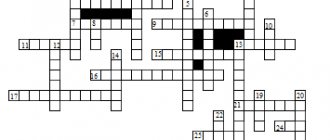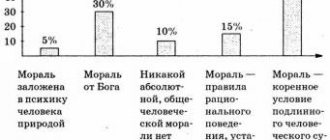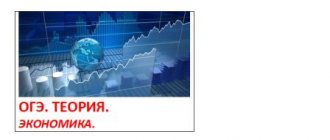Agrarian society is a stage of socio-economic development in which the greatest contribution to the cost of material goods is made by the cost of resources produced in agriculture.
The Bar is a social and legal institution engaged in the protection of the rights, freedoms and interests of the principal in court and other legal means.
A joint stock company is a commercial organization whose authorized capital is divided into a certain number of shares
A share is a security that secures the rights of its owner to receive part of the profit of a joint-stock company in the form of dividends
Anarchy - anarchy
Banknotes - paper money
A bank is a financial institution whose main activities are transactions with money, precious metals and securities.
Barter is the natural exchange of one thing for another
Good is everything that can satisfy people’s daily life needs, bring benefit to people, and bring pleasure.
Budget – the sum of income and expenses for the year
Currency - banknotes of foreign countries used in international payments
Military service is the most important type of activity of citizens of the Russian Federation in the armed defense of the Fatherland.
Reproduction is a constantly repeating process of production, distribution, exchange and consumption
Domestic trade – trade within one country
Foreign trade – trade with foreign countries
The Universal Declaration of the Rights of Man and of the Citizen is an international human rights document
Election is a procedure for electing someone by open or secret ballot.
Robbery - open theft of someone else's property
Citizen is an individual associated with a particular state on a political and legal basis.
A state is a power-political organization that has sovereignty, a special apparatus of control and coercion, and establishes legal order in a certain territory.
Globalization is the process of worldwide economic, political, cultural and religious integration and unification.
State power is a system of political institutions involved in organizing public life in a certain territory.
State sovereignty is the independence of the state in external affairs and supremacy in internal affairs.
State symbols - distinctive signs of the state
Humanism is a worldview centered on the idea of man as the highest value
Detective - a person who searches, tracks events and movements of people on an individual basis
Money is a specific product of maximum liquidity, which is a universal equivalent to the cost of other goods or services.
Leisure is free time when you are not busy with work or important matters.
The State Duma is the lower house of the Federal Assembly
Legal capacity is the ability of a person to acquire and exercise rights and obligations through his actions.
Democracy is a political regime based on the method of collective decision-making with equal influence of participants on the outcome of the process or on its significant stages
A democratic state is a state whose organization and activities are aimed at recognizing and ensuring the sovereignty (sovereignty) of the people, the rights and freedoms of man and citizen.
Discipline is a qualitative characteristic of order, organization in a particular community or sphere of people’s life.
Differentiation - difference.
Family income is all the money received by its members from various sources.
A will is a personal disposition of a citizen’s property in the event of death
Law is a normative legal act that is adopted by a representative (legislative) body of state power in a special manner, regulates certain social relations and is provided with the possibility of applying state coercive measures
Law-abiding behavior is socially useful, conscious behavior of people and organizations that complies with legal norms and is guaranteed by the state
Salary - remuneration for work
Production costs - the sum of all costs for the production (production) of goods or services
Land is a factor of production or production resources given by nature itself, i.e. all natural resources (land, forests, water, deposits)
Ideological diversity - the free existence in society of different political and other views
Industrial society is a society formed in the process and as a result of industrialization, the development of machine production, the emergence of forms of labor organization adequate to it, and the application of scientific and technological progress.
A sole proprietorship is a business that is owned and operated by one person.
Integration is the process of combining parts into a whole.
Information revolution - transformation of social relations due to fundamental changes in the field of information processing
Exhaustible resources are resources that decrease as they are used.
Capital is money invested in means of production - buildings, structures, production equipment, tools, raw materials, materials, etc.
Qualification - level of preparedness, degree of suitability for any type of work
A class is a group of people, one of whom can appropriate the work of another, due to the difference in their place in a certain structure of the social economy.”
Convertibility – the ability to exchange the currency of a country for a foreign one
The Constitution is the fundamental law of the state
The constitutional system is a system of economic, social and political-legal relations established and protected by the constitution
Limit - maximum norm
A license is a permission to have the right, or the right to perform certain actions, which can be certified (confirmed) by a document of the same name.
Manner - external forms of behavior
Material (economic) benefits are properties of objects that can satisfy economic needs
Material production is production directly related to the creation of material goods that satisfy certain needs of man and society.
The world community is a system that unites the international community of all states and peoples of the Earth, integrating in view of global goals, for the joint defense of peace, freedom, and solving global problems of our time.
World money is money that can be used to settle international transactions.
Exchange value is a quantitative relationship expressing the value of one product through the value of another
Monarchy is a form of government in which supreme state power partially or fully belongs to one person - the monarch and, as a rule, is inherited.
Tax is a mandatory gratuitous payment levied by the central government or local authorities from organizations and citizens in order to finance government expenses.
An heir is a person who has received or has the right to inherit the property, money, title, etc. of a person who has died.
Subsistence farming is a type of farming in which the products of labor are produced to satisfy the producers themselves, rather than for sale.
Denomination is the face value indicated on securities, banknotes, and goods.
Notary is a person authorized by the state in accordance with the established procedure to perform notarial acts.
Notary is a public institution engaged in certifying transactions and giving legal force to various documents.
A non-democratic state - the state exercises total control over all spheres of life of society as a whole and the individual as well.
Inexhaustible resources - resources, the decrease of which is imperceptible even during very long use: energy from solar radiation, wind, sea tides
Poverty - extreme poverty
Lifestyle is a certain way of activity of these individuals, a certain type of their life activity
Social relations are various social relationships that arise in social interaction, related to the position of people and the roles they perform in society.
Society is a part of the material world isolated from nature, representing a historically developing form of human life.
Exchange - the movement of goods from one owner to another
A ritual is a set of actions of a stereotypical nature, which has a symbolic meaning.
Custom is a set of ideas, rituals, habits and skills of practical and social activity, passed on from generation to generation, serving as one of the regulators of social relations.
Total costs - the sum of fixed and variable costs required for a certain volume of output
Optimization is the process of selecting the best option from possible ones.
Wholesale trade – sale of goods in large quantities
Pact – international treaty, agreement
Parliament is the highest representative and legislative body in states where the separation of powers has been established.
Variable costs are a type of cost, the value of which, unlike fixed costs, changes with changes in production volumes.
Defendant - a person brought to trial on charges of any crime
Policy is a general guide for action and decision making that facilitates the achievement of goals.
Political life is a set of relations arising in connection with the management of society and the state,
Political regime - political management, that is, a set of methods, techniques and forms of implementing political relations in society (state)
Use value is the usefulness of a thing, its ability to satisfy any human need.
The oath is a ceremonial, solemn oath taken by every citizen upon enlistment (conscription) for military service in the armed forces of the state.
The principle of separation of powers is a political and legal theory, according to which state power should be divided between branches independent from each other: legislative, executive and judicial
Justice is a type of law enforcement and law enforcement state activity, as a result of which judicial power is implemented (manifested)
The government is the highest collegial executive body of public administration,
Labor productivity is the number of products produced by a worker per unit of time.
Rule of law - a state whose all activities are subject to the norms and fundamental principles of law
Entrepreneurship is an economic activity aimed at systematically generating profit from the production and/or sale of goods and the provision of services.
The President is the head of state in countries with a republican or mixed form of government
Presumption of innocence - the accused is innocent until proven guilty
Supply is the total quantity of a product that can be put up for sale over a certain period of time under certain conditions.
A crime is an offense, the commission of which entails the application of criminal liability measures to a person.
Profit is the positive difference between income (revenue from the sale of goods and services) and the costs of production or acquisition and sale of these goods and services. Profit =
Revenue − Costs (in monetary terms).
A habit is an established way of behavior, the implementation of which in a certain situation acquires for the individual the character of a need that “encourages him to perform some actions or deeds.”
Verdict - a court decision regarding the guilt of the defendant and its consequences, which is the result of consideration of the case on the merits
Progress is the direction of development from lower to higher, from less perfect to more perfect.
Manufacturer - one who participates in the creation of goods and services
Misdemeanor - an action or inaction that encroaches on those established by laws or regulations. Illegal behavior - antisocial behavior of an individual, embodied in his misconduct (actions or inactions), causing harm to both individual citizens and society as a whole.
Manufacturing is the process of creating a product.
A producing farm is a farm in which the main source of subsistence is cultivated plants and domestic animals.
Interest - payment from the deposit
Profession is a type of labor activity of a person who possesses a complex of theoretical knowledge and skills acquired during special training.
Political diversity is a principle that promotes the existence of a diversity of political forces with competition between them for representation in government bodies.
Police - a system of public services and public order protection agencies
Fixed costs are costs that do not change with changes in production volume.
Post-industrial society is a society in which, as a result of the scientific and technological revolution and a significant increase in income, priority has shifted from the primary production of goods to the production of services.
Consumption is the use of a product in the process of satisfying needs.
Consumer – someone who uses goods and services to satisfy their needs
Work is a human activity; aimed at creating value or satisfying the needs of other people;
Robbery - open theft of someone else's property using violence
Division of labor is the delimitation of the activities of workers in the process of joint labor, their specialization in performing a certain part of the work.
Rentier is a layer of monetary capitalists who are not associated with business activity and live on interest from the money they lend.
Rational choice is a consumer choice based on the desire to extract as much benefit as possible from the consumption of goods and services in order to maximally satisfy needs at minimal cost.
Revolution is a radical transformation in any area of human activity
Regression is a type of social development, a transition from higher forms to lower ones, a decrease in the level of organization, changes for the worse; the opposite of progress.
Advertising – information about the consumer properties of goods or services for the purpose of sale
Resources are the opportunities available to society to create goods and satisfy needs.
Republic is a form of government in which all government bodies are either elected for a certain term
Referendum – popular election
Reform is a change in any area of life that does not affect the functional foundations, or a transformation introduced by legislation
Ritual - a solemn ceremony, a cult rite
Retail trade – sale of single goods or small lots
Market is a category of commodity economy, a set of economic relations based on regular exchange transactions between producers of goods (services) and consumers
Distribution - division of the produced economic product
Self-control is the ability to control one’s actions, expressions of emotions and internal impulses.
A sanction is a measure of influence, the most important means of social control.
Cost is the financial costs of an enterprise aimed at servicing current expenses for the production and sale of goods and services
Family budget - a pre-compiled list of future income and expenses
A secular state is a state in which there is no official, state religion and no creed is recognized as mandatory or preferable.
Witness - a person who may be aware of any circumstances relevant to the investigation and resolution of a criminal, administrative, civil or arbitration case, and who is called to testify.
Freedom is the ability of an individual to determine his own goals and be responsible for the results of his activities.
Specialization is the performance of homogeneous labor operations by a production worker within the framework of his technological organization.
Demand is the quantity of goods and services that buyers want to purchase
Cost is a measure by which the value of a product or its usefulness is determined.
Country is a territory that has certain national, climatic, cultural, historical or political boundaries
Property – ownership of economic goods to certain persons
The Federation Council is the highest chamber of the Federal Assembly
Accomplice - A person who participates with someone else in doing something (usually unseemly).
A social group is any relatively stable collection of people interacting and united by common interests and goals.
A social community is a real association of people, objectively determined by the way of their stable interconnection, in which they act (manifest themselves) as a collective subject of social action.
Social stratum - a set of individuals united according to some common characteristics and having the same social position
Social inequality is a form of differentiation in which individuals, social groups, strata, classes are at different levels of the vertical social hierarchy and have unequal life chances and opportunities to satisfy needs.
Social bottom - the bottom layer of the lower class
A social state is a state with a socially oriented economy that creates actual and legal conditions that ensure a decent life and free development of a person...
A social norm is generally accepted rules, patterns of behavior, standards of activity designed to ensure orderliness, sustainability and stability of the social interaction of individuals and social groups.
Litigation - consideration of cases in court.
Spheres of public life are large, stable, relatively independent subsystems of human activity.
Taboo - prohibition
Talion is the principle of sentencing for a crime, according to which the punishment should reproduce the harm caused by the crime (“an eye for an eye, a tooth for a tooth”).
Terrorism is a policy based on the systematic use of terror
Product – a product produced for sale
Commodity farming is a type of farming in which goods are produced not for personal consumption, but for sale.
Partnership is a voluntary association of two or more people to organize their own business.
Tolerance - tolerance to other kinds of views, morals, habits
Trade is a branch of the economy in which goods are sold through purchase and sale.
Labor is a purposeful, conscious human activity aimed at meeting the needs of the individual and society.
A labor dynasty is when people of the same profession pass on skill from generation to generation,
An employment contract is an agreement between an employee and an employer that establishes their mutual rights and obligations
Commissioner for Children's Rights is a position of the federal state civil service of the Russian Federation
Management is the process of planning, organizing, motivating and controlling necessary to formulate and achieve the goals of an organization
Unification - bringing to uniformity, to a single form or system.
Damage - unfavorable property consequences for the creditor resulting from an offense committed by the debtor
Price – the amount of money that is paid when purchasing goods or services
The price of a product is its value expressed in monetary form.
A ceremony is a solemn performance of something, a solemn event, a rite according to established rules.
The Federal Assembly - the parliament of the Russian Federation - is the representative and legislative body of the Russian Federation.
A federal state is a form of government in which parts of the federal state are state entities that have legally defined political independence.
A fine is a monetary penalty, a measure of material impact on persons guilty of violating certain rules.
Economy is the economic activity of society, as well as the set of relations that develop in the system of production, distribution, exchange and consumption
Etiquette is a set of rules of conduct and treatment accepted in certain social circles
Ethnicity is a historically formed group of people united by common linguistic and cultural characteristics.



